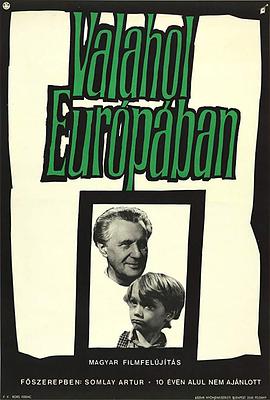-
 豆瓣7.4
DVD
豆瓣7.4
DVD
-
欧洲的某个地方
- 主演: Artúr Somlay Miklós Gábor Zsuzsa Bánki
- 导演: Radványi Géza
- 分类: 电影
- 地区: 其它
- 年份: 1948
- 2024-07-18
- 短评: Somewhere in the remote region, the war ends. In the midst of ruined cities and houses in the stre
-
扫描二维码打开
Somewhere in the remote region, the war ends. In the midst of ruined cities and houses in the streets, in rural hamlets, everywhere where people still live, are children who have lost their homes and parents. Abandoned, hungry, and in rags, defenseless and humiliated, they wander through the world. Hunger drives them. Little streams of orphans merge into a river which rushes forward and submerges everything in its path. The children do not know any feeling; they know only the world of their enemies. They fight, steal, struggle for a mouthful of food, and violence is merely a means to get it. A gang led by Cahoun finds a refuge in an abandoned castle and encounters an old composer who has voluntarily retired into solitude from a world of hatred, treason, and crime. How can they find a common ground, how can they become mutual friends? The castle becomes their hiding place but possibly it will also be their first home which they may organize and must defend. But even for this, the price will be very high.
To this simple story, the journalist, writer, poet, scriptwriter, movie director, and film theoretician Béla Balázs applied many years of experience. He and the director Géza Radványi created a work which opened a new postwar chapter in Hungarian film. Surprisingly, this film has not lost any of its impact over the years, especially on a profound philosophical level. That is to say, it is not merely a movie about war; it is not important in what location and in what period of time it takes place. It is a story outside of time about the joyless fate of children who pay dearly for the cruel war games of adults.
At the time it was premiered, the movie was enthusiastically received by the critics. The main roles were taken by streetwise boys of a children's group who created their roles improvisationally in close contact with a few professional actors, and in the children's acting their own fresh experience of war's turmoil appears to be reflected. At the same time, their performance fits admirably into the mosaic of a very complex movie language. Balázs's influence revealed itself, above all, in the introductory sequences: an air raid on an amusement park, seen in a montage of dramatic situations evoking the last spasms of war, where, undoubtedly, we discern the influence of classical Soviet cinematography. Shooting, the boy's escape, the locomotive's wheels, the shadows of soldiers with submachine guns, the sound of a whistle—the images are linked together in abrupt sequences in which varying shots and expressive sharp sounds are emphasized. A perfectly planned screenplay avoided all elements of sentimentality, time-worn stereotypes of wronged children, romanticism and cheap simplification. The authors succeeded in bridging the perilous dramatic abyss of the metamorphosis of a children's community. Their telling of the story (the scene of pillaging, the assault on the castle, etc) independently introduced some neorealist elements which, at that time, were being propagated in Italy by De Sica, Rossellini, and other film artists. The rebukes of contemporary critics, who called attention to "formalism for its own sake" have been forgotten. The masterly art of cameraman Barnabás Hegyi gives vitality to the poetic images. His angle shots of the children, his composition of scenes in the castle interior, are a living document of the times, and underline the atmosphere and the characters of the protagonists. The success of the picture was also enhanced by the musical art of composer Dénes Buday who, in tense situations, inserted the theme of the Marseilaise into the movie's structure, as a motive of community unification, as an expression of friendship and the possibility of understanding.
Valahol Europaban is the first significant postwar Hungarian film. It originated in a relaxed atmosphere, replete with joy and euphoria, and it includes these elements in order to demonstrate the strength of humanism, tolerance, and friendship. It represents a general condemnation of war anywhere in the world, in any form.
猜你喜欢
- 豆瓣7.5 更新至第06集 重启 Holly Austin,Lee Beckhurst,Nicholas Colla
- 0播放 TC中字 索命哨 达芙妮·基恩,苏菲·奈丽丝,珀西·海恩斯·怀特,尼克·弗罗斯特,艾丽·斯考比,杨子英,斯蒂芬·卡林,米卡·阿蒙森,迈克尔·科拉斯,贾纳娅·斯蒂芬斯,兰内特·瓦雷,特洛伊·詹姆斯,贾利勒·斯瓦比,蒋如思,朱莉娅·迪扬,Cameron Gordon Norris,Toria Summerville,Louis Adams,梅努卡·萨瓦尔,克里斯蒂娜·萨赫利
- 豆瓣6.3 HD国语 整蛊王 刘青云,袁咏仪,罗家英,林海峰,葛民辉,谢霆锋
- 豆瓣7.1 HD中字 巴尔干边界 安东·庞布施尼,尤里·库琴科,米洛斯·比柯维奇,米莱纳拉·德罗维奇,拉芙珊娜·库珂娃,阿勒克山达·斯雷科维奇,乔基科·米提克,德米特里·弗里德,米奥德拉格·拉多尼奇,埃米尔·库斯图里卡,谢尔盖·马林,尼基塔·科洛格利维,罗曼·库特辛,亚历山大·拉多伊契奇,埃菲姆·彼得鲁宁,安瓦尔·哈里路拉耶夫,瓦西利萨·涅姆科娃
- 1播放 更新至166集 绝世战魂 黄宥天,朱丽岚,金玄雨,赵熠洋,廖茉汐,王荣宏
- 0播放 1080P 悬崖绝壁 佩丽冉卡·曹帕拉,卡尔·厄本,特穆拉·莫里森,伊斯梅尔·克鲁斯·科尔多瓦,加里·比德尔,萨菲亚·奥克利-格林,大卫·菲尔德,扎克·莫里斯,格雷格·哈顿,萨钦·乔伯,帕卡罗·姆泽贝,乔丹·穆尼,罗尼·詹姆斯·休斯,莎伦·布鲁克斯,艾克·楚特,乔恩·奎斯蒂德,吉迪恩·姆泽姆贝,拉斯·加拉格尔,维丹滕·奈杜,内斯特·卢卡斯
- 0播放 1080P 全面开战:兄弟会 纳鲁纳·科斯塔,Camilla Damião,大卫·桑托斯,艾尔兹奥·维埃拉,Enio Cavalcante,艾米拉·盖德斯,Lee Taylor,马西莉亚·卡尔塔舒,塞乌·乔奇,史蒂法尼·莫塔,Samurai Cria
- 0播放 1080P 指控之后 普拉蒂巴·兰塔 康柯纳·森·沙尔玛
- 0播放 1080P 未来之心 乔新峰,曹艳,张恩硕,张德晖,宫苏纹
- 0播放 1080P 奉法而行 米基·洛克 彼得·费辛利 妮基·韦兰 丹妮尔·哈丽丝 布伦丹·费
- 0播放 已完结 狂暴巨鳄 张旭,王思平,保罗.凯,曾晨,孙欣博
- 豆瓣7.0 更新至第09集 异国日记 新垣结衣,早濑憩,夏帆,小宫山莉渚,濑户康史